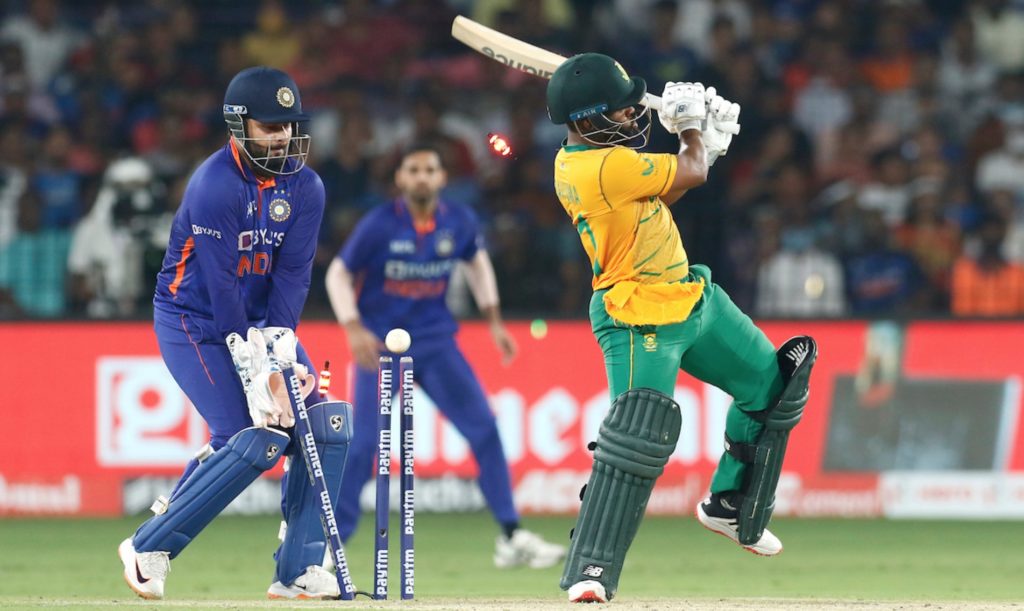The Proteas T20 batting lineup would be stronger without Temba Bavuma at the top, writes SIMON BORCHARDT.
The Proteas cannot afford to carry passengers if they are to win this year’s T20 World Cup in Australia. And that is what white-ball captain Temba Bavuma has become in the shortest form of the game.
While Bavuma has been one of the Proteas’ best batsmen in Test cricket over the past year, scoring 515 runs at an average of 46.81, and has a good ODI record, his accumulating style of batting is not suited to T20s where teams need to blast from ball one.
It’s why he wasn’t among the 600 players selected for the IPL auction earlier this year and is unlikely to ever feature in cricket’s richest T20 tournament. The franchise’s money is better spent elsewhere.
In the third T20I against India on Tuesday night, Bavuma made just eight runs off 10 balls which, along with fellow opener Reeza Hendricks’ 23 off 20, put the rest of the batting order under huge pressure in pursuit of 180 to win. By the time the in-form David Miller joined another big hitter in Heinrich Klaasen at the crease, they had been left with way too much to do.
Bavuma’s unsuitability for the role of T20 opener has been further exposed by the absence of the injured Quinton de Kock during the past two matches. When De Kock is smashing boundaries from one end in the first powerplay, Bavuma can get away, in some cases, with a run-a-ball innings. When De Kock is absent, you end up with a situation like on Tuesday night where the Proteas scored just 23 runs in the first four overs.
The harsh reality is that Bavuma doesn’t make his runs quickly enough in T20 cricket.
In the first match against India, he scored 10 off eight balls and while he got 35 in the second, he used up 30 deliveries. In both of those games, the Proteas needed some big-hitting brilliance from other batsmen to get them over the line.
At last year’s T20 World Cup in the UAE, Bavuma’s 91 runs in four innings came at a strike rate of 108.33. That’s just not good enough.
To win a T20 World Cup, the Proteas need two opening batsmen who can strike fear into the hearts of opposition bowlers. Australia, the reigning T20 world champions, have that in David Warner and Aaron Finch.
South Africa could have that, too, if either Faf du Plessis or Rilee Rossouw partnered De Kock at the top of the order.
Du Plessis, who remains available for Proteas selection, showed again during this year’s IPL how effective he is in this form of the game – scoring 468 runs in 16 innings at an average of 31.20 and a strike rate of 127.52. That included three half-centuries and a top score of 96 off 64 balls.
Du Plessis’ age (37) or the fact that he is a ‘free agent’ without a CSA contract should not count against him.
Rossouw gets flak from some Proteas fans on social media because of the way he left South African cricket in 2017 (taking a lucrative Kolpak deal after he’d been backed during a rough start to his ODI career by then coach Russell Domingo). But the 32-year-old is part of South African domestic cricket again and his recent T20 form warrants a Proteas recall.
Rossouw is currently the second-highest run-scorer in England’s T20 Blast with 298 for Somerset at an average of 59.60 and a strike rate of 191.02, with three fifties. And in last year’s CSA T20 Knock Out, he scored 295 runs at an average of 98.33 and a strike rate of 157.75, including a century and two fifties, to help the Free State Knights win the tournament.
If winning a T20 World Cup is the top priority for the Proteas, then the selectors need to ask themselves a simple question: would replacing Bavuma with Du Plessis or Rossouw make the batting lineup stronger?
The answer is obvious.







